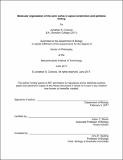Molecular organization of the actin cortex in apical constriction and epithelial folding
Author(s)
Coravos, Jonathan S. (Jonathan Stuck)
DownloadFull printable version (31.70Mb)
Other Contributors
Massachusetts Institute of Technology. Department of Biology.
Advisor
Adam C. Martin.
Terms of use
Metadata
Show full item recordAbstract
Actin and myosin generate contractile forces to change tissue and cell shape. These shape changes are essential for many biological functions, ranging from muscle contraction to tissue morphogenesis in development. While the spatial organization and composition of the actin and myosin contractile force generating machine is well known in muscle, it is less understood in nonmuscle epithelia, which change shape during development and form functional barriers on an organism's inner surfaces. Prevailing models for nonmuscle contractility suggest that the intrinsic ability of mixed polarity actin networks and uniformly distributed myosin to contract into asters drives nonmuscle contractility. Here, I provide insight into the mechanism of nonmuscle contraction by demonstrating that the apical actin cortex and associated proteins are spatially organized in epithelia. In addition, I demonstrate that this spatial organization forms a sarcomere-like actomyosin apparatus, which is essential for epithelial contractility. This updated model is likely to inform our understanding of a wide range of contractile force-generating systems, and may lead to advances in understanding of pathologies that involve defects in contractility, like cardiovascular disease and pulmonary fibrosis.
Description
Thesis: Ph. D., Massachusetts Institute of Technology, Department of Biology, 2017. This electronic version was submitted by the student author. The certified thesis is available in the Institute Archives and Special Collections. Cataloged from student-submitted PDF version of thesis. Includes bibliographical references (pages 120-139).
Date issued
2017Department
Massachusetts Institute of Technology. Department of BiologyPublisher
Massachusetts Institute of Technology
Keywords
Biology.